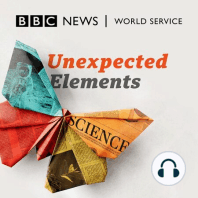68 min listen
Are children the biggest Covid-19 spreaders?
ratings:
Length:
71 minutes
Released:
Oct 4, 2020
Format:
Podcast episode
Description
An analysis of Covid-19 data from South India shows children more than any other group are transmitting the virus both to other children and adults, Epidemiologist Ramanan Laxminarayan tell us the data also shows the situations in which the virus is most likely to spread, public transport is of particular concern.
The WHO has launched an initiative to roll out rapid testing, particularly to countries that don’t have access to lab based tests, Catharina Boehme who leads one of the WHO’s partner organisation in the project tells us the test, which looks similar to home pregnancy tests should give results within fifteen minutes.
Andrea Crisanti led a ground-breaking testing initiative in Italy which eliminated Covid-19 in a small town in a matter of weeks. We look to the lessons learned.
And in California residents have been in a kind of self- enforced lockdown, not because of Covid – 19 but due to wildfires fires. Molly Bentley from the Seti Institute podcast ‘ Big Picture Science’ tells us about how the fires have created an atmosphere of toxic smoke, even in the cities.
Also, What makes things sticky? Listener Mitch from the USA began wondering while he was taking down some very sticky wallpaper. Our world would quite literally fall apart without adhesives. They are almost everywhere – in our buildings, in our cars and in our smartphones. But how do they hold things together?
To find out, presenter Marnie Chesterton visits a luthier, Anette Fajardo, who uses animal glues every day in her job making violins. These glues have been used since the ancient Egyptians –but adhesives are much older than that. Marnie speaks to archaeologist Dr Geeske Langejans from Delft University of Technology about prehistoric glues made from birch bark, dated to 200,000 years ago. She goes to see a chemist, Prof Steven Abbott, who helps her understand why anything actually sticks to anything else. And she speaks to physicist Dr Ivan Vera-Marun at the University of Manchester, about the nanotechnologists using adhesion at tiny scales to make materials of the future.
(Image: Getty Images)
The WHO has launched an initiative to roll out rapid testing, particularly to countries that don’t have access to lab based tests, Catharina Boehme who leads one of the WHO’s partner organisation in the project tells us the test, which looks similar to home pregnancy tests should give results within fifteen minutes.
Andrea Crisanti led a ground-breaking testing initiative in Italy which eliminated Covid-19 in a small town in a matter of weeks. We look to the lessons learned.
And in California residents have been in a kind of self- enforced lockdown, not because of Covid – 19 but due to wildfires fires. Molly Bentley from the Seti Institute podcast ‘ Big Picture Science’ tells us about how the fires have created an atmosphere of toxic smoke, even in the cities.
Also, What makes things sticky? Listener Mitch from the USA began wondering while he was taking down some very sticky wallpaper. Our world would quite literally fall apart without adhesives. They are almost everywhere – in our buildings, in our cars and in our smartphones. But how do they hold things together?
To find out, presenter Marnie Chesterton visits a luthier, Anette Fajardo, who uses animal glues every day in her job making violins. These glues have been used since the ancient Egyptians –but adhesives are much older than that. Marnie speaks to archaeologist Dr Geeske Langejans from Delft University of Technology about prehistoric glues made from birch bark, dated to 200,000 years ago. She goes to see a chemist, Prof Steven Abbott, who helps her understand why anything actually sticks to anything else. And she speaks to physicist Dr Ivan Vera-Marun at the University of Manchester, about the nanotechnologists using adhesion at tiny scales to make materials of the future.
(Image: Getty Images)
Released:
Oct 4, 2020
Format:
Podcast episode
Titles in the series (100)
Amazonian fires likely to worsen: Is it going to be a particularly bad burning season for Brazil’s rainforest? by Unexpected Elements
